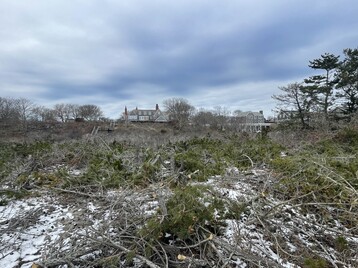ConCom Split On Pursuing Criminal Charges For Clear-Cutting In Sconset
Jason Graziadei •

The Conservation Commission was split on whether to consider criminal charges against the people responsible for clear-cutting a coastal bank in Sconset late last year, but continue to hold their feet to the fire for mitigating the damage done.
In what was dubbed the “Christmas Catastrophe,” at least 137 Japanese black pines and an eastern red cedar tree in the coastal bank at 2 Gully Road were chopped down. The clear-cutting came just before the $4.75 million sale of the property from the DiMartino family to the The Sconset Trust.
After discovering the clear-cutting, the Conservation Commission concluded that the DeMartinos had paid for the work to open up the ocean views from their estate at 1 Ocean Avenue, and issued enforcement orders against the DeMartinos and the landscaping company that did the work.
While the clear cutting was done on private property, it was conducted in an area considered to be a coastal bank, part of the shoreline that is protected under the Massachusetts Wetlands Protection Act, and under the purview of the Conservation Commission.
Last Thursday, the Conservation Commission identified the landscaper that allegedly completed the clear-cutting as Robert Slade, and the elected members of the ConCom discussed whether criminal charges were warranted against Slade and the DiMartinos.
“I would like to ask my fellow commissioned to agree with me to ask counsel if we can press criminal charges against the people who did this damage,” Conservation Commission vice-chair Ian Golding said. “It’s malicious damage at a level I don't think we’ve ever experienced.”
Conservation Commission member Seth Engelbourg responded to say that “There is a pathway within the wetlands protection act to pursue criminal charges for enforcement, it’s exceeding rare, but that pathway does exist. I don’t advocate for doing that, but that pathway has been done in other locations.”
Golding put forward a motion to “approach town counsel to see if criminal charges can be pressed against those who were responsible, directly or indirectly, for this incident.” But the vote on the motion was deadlocked at 3-3, with Golding, Linda Williams, and Mark Beale in favor, and Ashley Erisman, Seth Engelbourg and Joe Plandowski opposed.
A subsequent motion from Golding to “consult with town counsel as to what the ramifications might be, what the Conservation Commission might have at its disposal to deal with this incident,” was approved unanimously.
Further discussion on the enforcement order was postponed to the Conservation Commission's meeting on March 9.
But during Thursday’s discussion, it was disclosed that the DiMartinos had engaged the services of Paul Santos, of Nantucket Surveyors, along with attorneys Glen Wood and Rhoda Weinman, and Wilkinson Ecological Design, to represent them.
“Since the initial enforcement orders were issued, a project team was compiled to deal with this moving forward,” Santos said. “Oddly enough, this is a project that could be permissible as an invasive removal. Seth (Wilkinson) seemed confident enough coming up with a plan in that area that can work.”
Wood, who represents both the DiMartinos and landscaper Robert Slade, said he had been “given a green light to do the right job here,” with regard to mitigation. “I’m entirely confident our team will come back in with a strong application addressing the concerns to the greatest extent possible.”

